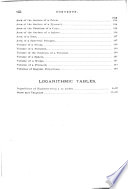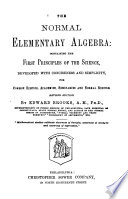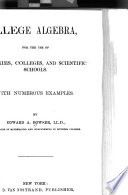 | Simon Newcomb - Algebra - 1884 - 572 pages
...— k = log-^, or log p — log q = log -• IX. THEOREM. Tfie logarithm of any power of a nujnber is equal to the logarithm, of the number multiplied by the exponent of the power. Proof. Let h = log p, and let n be the exponent. Then 0* = p. Raising both sides to the n^ power, Whence... | |
 | Charles Davies, Adrien Marie Legendre - Geometry - 1885 - 538 pages
...p, we have, 10*" = mfwhence, by the definition, xp = logm". (8.) That is, the logarithm of any power of a number is equal to the logarithm of the number multiplied by the exponent of the power. 8. Extracting the root, indicated by r, of both members of (4), we have whence, by the definition,... | |
 | George Chrystal - Algebra - 1886 - 572 pages
...divisor. III. The logarithm of any power (positive or negative, integral or fractional) of a positive number is equal to the logarithm of the number multiplied by the power. Let //,, yf . . . yn be n positive numbers, xa xv . . . xn their respective logarithms to base... | |
 | Edward Brooks - Algebra - 1888 - 344 pages
...Hence, log ( M •*• N) = m — n. Or log(M + N)=-logAT-logN. PRIN. 5. The logarithm of any power of a number is equal to the logarithm of the number multiplied by the exponent of the power. For, let 7W=logJI/. Then, B» = M. Eaising to nth power, B"XIll = AT". Whence, log Jl/" = nxm. Or log... | |
 | Charles Ambrose Van Velzer, Charles Sumner Slichter - Algebra - 1888 - 234 pages
...f«l 10g,, -| or, by equation (i), .<,. = log,, n— log,,,/-. 9. THEOREM. The logarithm of a power of a number is equal to the logarithm of the number multiplied by the exponent of the power. Let n be any number, and let log,,« = .v. Then, by definition, n = a*. Consequently nf=af*. Therefore,... | |
 | George Albert Wentworth - Arithmetic - 1888 - 392 pages
...32. log 1.05. 412. As logarithms are simply exponents, therefore (§ 381), The logarithm of a power of a number is equal to the logarithm of the number multiplied by the exponent of the power. Thus, log 5' = 7 X log 5= 7x0.6990 = 4.8930. log 3" = 11 x log 3 = 11 x 0.4771 = 5.2481. 413. As logarithms... | |
 | Edward Albert Bowser - Algebra - 1888 - 868 pages
...n. n Thus, log *£ = log 42 — log 5 = log 2 + Iog3 + log? - Iog5. (6) The logarithm of any power of a number is equal to the logarithm of the number multiplied by the exponent of the power. For let x = log m ; then m = a*. Therefore m" = (a1)" = a** ; whence by definition, log mp = px = p... | |
 | George Albert Wentworth - 1888 - 388 pages
...0.4771 = 5.2481. 413. As logarithms are simply exponents, therefore (§381), The logarithm of a root of a number is equal to the logarithm of the number multiplied by the index of the root. Thus, log 2* = \ of log 2 = JX 0.3010 = 0.0753. log .002* = J of (7.3010 - 10).... | |
 | James Morford Taylor - Algebra - 1889 - 400 pages
...a*'. Hence log., (Af) = px=p log„ M. 306. By § 305, the logarithm of any power of a number equals the logarithm of the number multiplied by the exponent of the power ; and the logarithm of any root of a number equals the logarithm of the number divided by the index... | |
 | William Findlay Shunk - Railroad engineering - 1890 - 360 pages
...equal to the logarithm of the dividend diminished by that of the divisor. The logarithm of any power of a number is equal to the logarithm of the number multiplied by the exponent of the power. The logarithm of any root of a number is equal to the logarithm of the number divided by the index... | |
| |